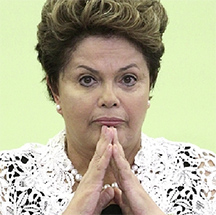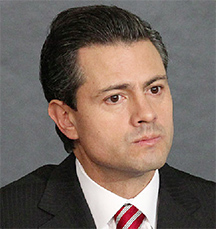The start of 2015 finds Latin America turned into a leaderless region, in which the countries with the biggest political clout in recent years — Brazil, Venezuela and Mexico — have been significantly weakened by domestic troubles.
Brazil, the biggest Latin American country, is beset by economic and political problems. President Dilma Rousseff starts her second term Thursday as her country’s weakest president in recent memory. She faces a stagnant economy, a sizable opposition in the Brazilian Congress, and a growing political scandal surrounding Petrobras oil company bribes to ruling party officials.
While the nearly half of Brazil’s population that voted against her in the October 26 elections remain energized against her left-of-centre government, many of those who voted for her did so with little enthusiasm, mostly out of fear of losing their government subsidies, pollsters say.
 Despite the recent appointment of respected banker Joaquim Levy as finance minister, few expect Rousseff to have the political capital to implement much-needed economic reforms. “The outlook for the next four years is gloomy,” the Economist magazine said this week.
Despite the recent appointment of respected banker Joaquim Levy as finance minister, few expect Rousseff to have the political capital to implement much-needed economic reforms. “The outlook for the next four years is gloomy,” the Economist magazine said this week.
Most Brazilian analysts agree that the growing Petrobras scandal and the urgent need to revamp Brazil’s ailing economy will preclude Rousseff from playing a big role in regional affairs. In recent years, Brazil had been the driving force behind the creation of regional blocs such as the Union of South American Nations (UNASUR) and the Community of Latin American and Caribbean States (CELAC), as well as a first among equals in the region’s diplomatic affairs.
Venezuela, whose oil subsidies to more than a dozen Latin American and Caribbean countries in exchange for political support that turned it into one of the most active regional players, is in its deepest economic crisis in recent history.
The collapse in world oil prices has turned Venezuela into Latin America’s country with the world’s highest annual inflation rate — estimated at 65 per cent — and Latin America’s lowest economic growth, according to International Monetary Fund estimates. Since late President Hugo Chávez’ Socialist Revolution, Venezuela has virtually destroyed its private sector, and now relies on oil for 95 per cent of its export income.
Faced with a possible descent into hyper-inflation and economic chaos, Venezuela is beginning to cut its PetroCaribe subsidies to more than a dozen Central American and Caribbean countries, which is likely to severely curtail its regional clout. Even Cuba, Venezuela’s closest political ally and ideological mentor, recently struck a deal to normalize relations with the United States, possibly fearing an imminent cut of Venezuela’s oil subsidies.
Mexico, while not as active in regional affairs over the past decade, is unlikely to fill the void left by Brazil and Venezuela.
President Enrique Peña Nieto is facing a major political crisis following the disappearance and likely death of 43 students by drug gangs in cahoots with local authorities, and allegations of corruption surrounding his wife’s Angelica Rivera’s murky


purchase of a $7 million residence from a company that has benefited from huge government contracts.
In addition, the Peña Nieto government is under criticism for having awarded a $3.7 billion contract to build a Mexico-Queretaro high-speed train to a Chinese consortium that was the only firm participating in the bid. Peña Nieto rescinded the contract after widespread public complaints over the deal, which involved among others the company that had sold the $7 million house to the first lady.
A recent poll by the daily Reforma shows that 58 per cent of Mexicans have a negative opinion of Peña Nieto, the lowest approval rating of any Mexican president in nearly two decades.
My opinion: Considering the poor foreign policy choices made by Latin American countries under the leadership of Brazil and Venezuela in recent years — alienating the region from trade agreements with the European Union and the United States, and supporting some of the world’s worst dictatorships — perhaps it’s not a bad thing at all that the region is suddenly finding itself without strong political leaders.
Some US officials say privately that President Barack Obama’s announcement that he will normalize relations with Cuba — a long-time sore point in inter-American affairs — and Latin America’s growing need for US investments will help revamp Washington’s stand in the region.
That remains to be seen. But the fact that most Latin American countries will be able to pursue their economic interests without ideological constraints set by Brazil and Venezuela may end up helping the whole region.
Happy New Year!
© The Miami Herald, 2015. Distributed by Tribune Media Services.








